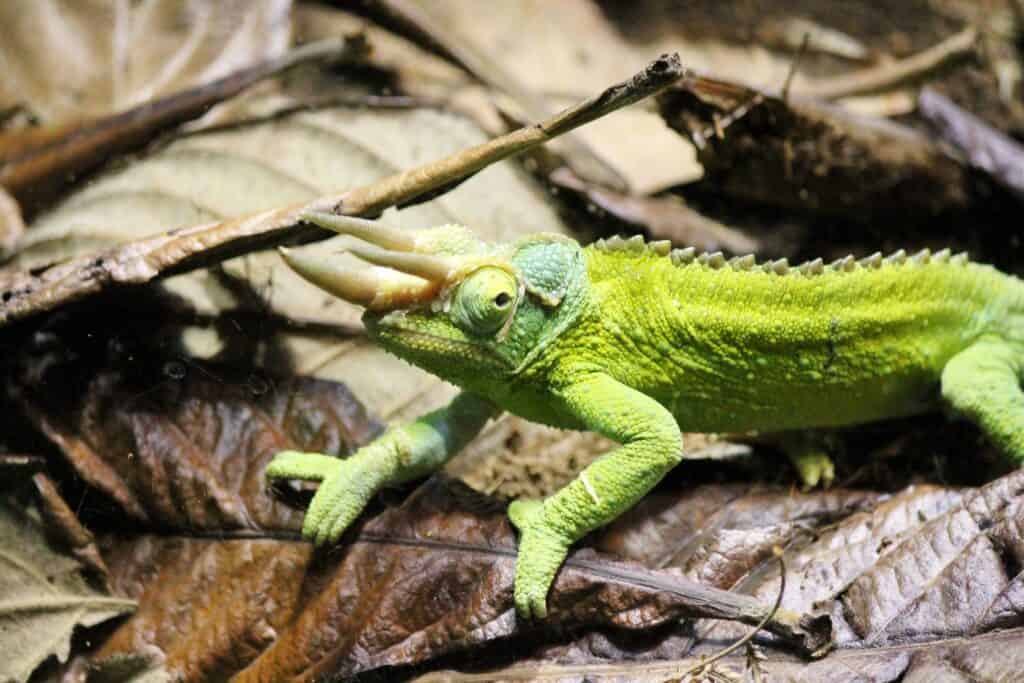
A Jackson’s chameleon lifespan is typically pretty short compared to most pets. While a Jackson’s chameleon lifespan might be shorter than many pet lizards, they are among the more popular due to their unique dinosaur aesthetic. But just how long do Jackson’s chameleons typically live in captivity?
The average Jackson’s chameleon lifespan is only about 5-8 years in captivity. A genetically healthy and well-maintained male Jackson’s chameleon can live for up to ten years but it is very unlikely.
While we can’t enjoy the company of any pet forever, familiarizing yourself with proper care techniques can help Jackson’s chameleon live a longer lifespan. That said, if you are looking for a pet with a long lifespan then the Jackson’s chameleon is probably not for you.
Just like humans, there is no one magic trick or food to lengthen a lifespan, it’s a series of good choices and genetics. The following information can help you make sure your Jackson’s chameleon enjoys a long, healthy life.
How Long Do Jackson’s Chameleons Live?
The average span of a Jackson’s chameleon typically ranges from five to ten years. Male Jackson’s chameleons tend to live a bit longer than females, who typically average from five to six years. Negating any accident, their lifespan is directly connected to genetics, diet, and care.
Though this might be the average, some Jackson’s chameleons lifespans might be as short as 2-3 years in some cases. Sadly, this can be the case even with proper care.
Because of this, I would say that the lifespan of a Jackson’s chameleon is a bit more unpredictable than with many other pet lizards. Chameleons get stressed easily and need the right environment to strive.
So even though you cannot know for sure how long your Jackson’s chameleon will live, it is likely that proper care will help ensure a longer lifespan.
Jackson’s Chameleons From Good Breeders Have Longer Lifespans
Genetics is a huge factor in lifespan, so where you adopt your Jackson’s chameleon is just as important as care. Skipping the pet store and going directly to a breeder might be the best choice.
Some pet stores source their reptiles from mass producers, and you will rarely get the chance to know who this was.
Avoid advertisements for single sales as well (eBay, Facebook Marketplace, etc) if you are looking for a healthy pet. You have no way of knowing how old or well cared for the animal truthfully is. Most online seller websites ban the sale of pets for this reason.
Using a breeder generally allows you to get a sense of the care and treatment of the chameleons. You may even learn more about what genetic stock they came from.
However, not all breeders are the same, so choosing the breeder carefully is also very important to your pet’s health and lifespan.
Breeders vary from large, to small, to part-time. Breeding lizards can be tricky and expensive, so some breeders may cut corners that harm the health of the animal.
Your best chance at a healthy Jackson’s chameleon is to go with the small breeders that specialize in Chameleons. Expect to pay more, but it might help your Jackson’s chameleon live a longer life.
Some ways to evaluate breeders may include:
- Invest your time into researching breeders and reach out to several of them with questions. If you want a pet that will be with you for a long time, you need to spend a little extra time upfront.
- Visit online forums and look for reviews on the breeder. If they’ve been established for a while, there is a good chance they are out there.
- Don’t be afraid to ask questions about husbandry and care. A good breeder will appreciate that you are curious about the pet’s health and safety. If the breeder is evasive or annoyed, be concerned.
- Familiarize yourself with the care tips below and more. The more knowledgeable you are on the signs of poor health, the less likely someone will try to sell you a less healthy pet.
- If the breeder is local, try to visit. Jackson’s chameleon breeders are rare and far between, but it would be a great opportunity if you can.
Healthy Diet And Jackson’s Chameleon Lifespan
While genetics can be blamed for some things, a lifespan of a chameleon is largely impacted by the way it is cared for. They are insectivores, so feeding a Jackson’s chameleon is fairly simple.
A typical adult will eat about 6-10 live medium crickets a day. Though keep in mind babies and young chameleons will eat more in comparison to their body weight. But you will need to feed them smaller crickets.
For the best optimal nutrition, feed your chameleon a varied diet as they would get in the wild.
- Crickets
- Various types of flies and larvae
- Various types of moths
- Roaches
- Silkworms
- Locusts
- Etc.
Supplementation For Optimal Health and A Longer Life
Supplements are also essential to making sure your chameleon is healthy. Jackson’s chameleons are not separated far physically from their wild counterparts, so domestic chameleons miss out on what nutrients the wild provides. Some of the most essential nutrients they may need include:
- Calcium – This is the most important supplement that they need and is usually administered in the form of dust.
- D3 – To help absorb the calcium, if they are not getting enough UVB light.
- A multivitamin – generally once a month.
Every animal is unique and may require a different dosage. It is very possible for a chameleon to overdose on vitamins, so be wary. T
aking your Jackson’s chameleon to the veterinarian in order to get a supplement schedule will yield the best results. They will be able to recommend the best plan based on size, health, and possibly blood work.
Once you start a schedule, keep an eye on activity and mood. If your chameleon seems off, a vitamin dosage may need adjusting and your veterinarian can help.
Hydration
Hydration is also a strong point to touch on if you want to make sure your chameleon lives a long and healthy life. Considering it is rarely an issue with other pets, it is the one care often overlooked.
You will need to mist their environment so that they can lick the moisture from the plants and walls.
Create a Habitat and Home for a Healthy Life
A Jackson’s chameleon is not the cheapest pet when it comes to enclosures. For optimal health and lifespan, you will need to carefully set up your Jackson’s chameleon’s habitat. This includes:
- Lighting
- Temperature controls
- Humidity controls
- Location of enclosure
- Size
The more the enclosure mirror’s their native habitat, the longer your chameleon will live. For more on setting up the ideal enclosure, checkout out my article on proper Jackson’s chameleon enclosure size!
As mentioned above, creating a wet, misted environment is essential for a Jackson’s chameleon. While it is possible to do this by hand several times a day, it is recommended that you invest in a drip and misting system that can automatically dispense water onto the plants and walls for the chameleon.
It is important to keep their cage humid for this reason as well. Humidity levels are an important factor in the overall health and lifespan of your Jackson’s chameleon.
Jackson’s chameleons also need a lot of light, preferably at least twelve hours a day. Window lighting is likely not to be enough, you will need a UV light system.
The enclosure will need to be temperature controlled as well. The temperature should be around 60 degrees at night and 80 degrees during the day.
Sensors can help you immensely in monitoring this. The investment is worth it if you want the longest life from your Jackson’s chameleon.
Common Illnesses Can Affect A Jackson’s Chameleons Lifespan
Jackson’s chameleons do have a few common illnesses that they are prone to. These are not necessarily death sentences, but they can shorten lifespan if not treated properly. The biggest ones are avoidable though, by careful monitoring and care.
Metabolic bone disease (the most common illness) can be avoided with proper light and supplements. Kidney failure brought on by dehydration can be avoided by proper hydration.
Respiratory infections can be avoided by keeping a clean cage. Getting a check-up for your chameleon at least once a year is the best way to keep an eye out for these.
Chameleons are especially susceptible to stress-related illness as well. If the environment is off or chaotic, their health will suffer. Avoid loud music and big movements around the enclosure; chameleons are not recommended in households with loud children for this reason.
Jackson’s chameleons also shouldn’t be handled often and do not appreciate being with other chameleons, these will both wear on their health and stress levels. Though Jackson’s chameleons typically have a mild temperament, they easily get stressed out from handling.
The Typical Jackson’s Chameleon Lifespan
A Jackon’s Chameleon lifespan can vary greatly from chameleon to chameleon. Though some of this might be out of your control, there are some things you can do to help ensure a longer lifespan for your Jackson’s chameleon.
The best way to keep your Jackson’s chameleon alive and healthy is to pay close attention and form a bond early. With some attentiveness and care, you can recognize if your chameleon is acting out of character.
This is important even if you do take them for regular vet visits. Your veterinarian will trust you to recognize if your pet is acting differently.
While not the easiest or most inexpensive pets, Jackson’s chameleons make great companions for any reptile enthusiast. Consider looking into the sources below for more in-depth care instruction. With care, time, and attention, your Jackson’s chameleon can live happily to its longest lifespan with you.
